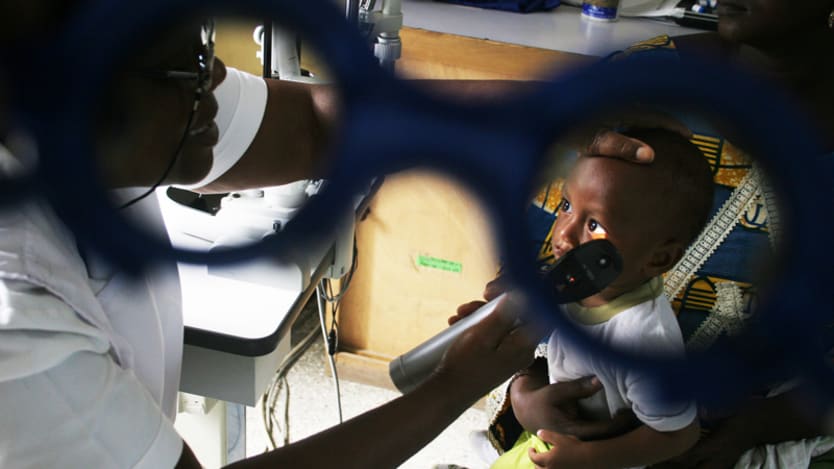
MANILA — The availability of free, quality eye care services sounds like a winning combination to address vision problems in poorly resourced communities. But one nonprofit has found it isn’t enough to prevent people from going blind.
“It is not that people will stop developing cataract, or people will stop developing refractive error problems, etc. … The change that we made was [the] eye-health seeking behavior.”
— Kashinath Bhoosnurmath, vice president of international programs, Operation Eyesight UniversalWhile visiting partner hospitals in southern India in 2009, Operation Eyesight Universal’s vice president of international programs, Kashinath Bhoosnurmath, learned that a handful of people in the hospitals’ service areas were still losing their sight — despite the availability of free eye care. Baffled, Bhoosnurmath and his team decided to investigate. They recruited community health workers and trained them in measuring visual acuity and identifying eye conditions. The community health workers were then assigned areas to go door to door, checking every household.
The result of the surveys shocked them.
“We thought: ‘We will find only about 2,000 to 2,500 cases maximum with cataract and other eye conditions,’” Bhoosnurmath said. “To our surprise, we ended up identifying about 12,000 cases.” Instead of the expected 1 percent of the population surveyed needing care, over 5 percent did.
They also found several of the patients were familiar with the hospital, but wouldn’t present themselves for diagnosis or treatment out of fear, or due to family influence or financial considerations — three oft-cited barriers to cataract surgeries.
► A bolder vision for eye care
► How India became a leader in low-cost, high-quality eye care
► In Ethiopia, a multipronged approach to tackle avoidable blindness
Patients feared the surgery would be unsuccessful and leave them completely blind. Another barrier was that many of the decision-makers within families — often sons, daughters or daughters-in-law — weren’t supportive of treatment. Some family members were afraid of losing a day’s wage by accompanying their parents or grandparents to the hospital, while others believed hospitals charge exorbitant fees.
Armed with this information, Bhoosnurmath led the team at Operation Eyesight Universal to refine their business model. Apart from door-to-door surveys, the organization also tapped community health workers to conduct health promotion, awareness, and education activities. About 90 percent of the community health workers were women with families, which allowed them to be welcomed and more easily trusted by people in the communities, Bhoosnurmath explained.
Often, the women health workers would apply their learnings at home with their own parents or elderly relatives, who would then visit the hospital to get diagnosed or undergo treatment or surgery. As they regained or improved their sight, more and more people in the community became convinced to follow.
The approach helped break barriers to eye health diagnosis and treatment, while at the same time elevating the status of health workers in communities. Over time, the community health workers were tasked with “cluster-based microplans,” which Bhoosnurmath described as annual plans that help them identify how many eye screening camps and awareness sessions they should conduct annually, and where.
“Those community health workers become a real critical part of that sustainability in the community. And ... that whole health-seeking behavior is what makes the demand side sustainable,” said Aly Bandali, Operation Eyesight Universal’s president and CEO. “So that when we go back and re-evaluate, what we ended up doing is ... working ourselves out of those communities because they now rely on themselves with the work that's being done to go to the hospital.”
As they help build the capacity of their partner hospitals, the improvements attract an increased number of patients, which in turn boosts hospital foot traffic and revenue, Bandali said.
“The hospitals that I visited for my first time [last year], what I was able to see was that 40 percent of the hospital-paying patients were able to sustain the hospital, so that 60 percent of the surgeries and treatments that were done for the poor were done free of charge in those hospitals. And the community health workers are paid from those revenues as well,” Bandali said.
The vision centers the NGO has set up in communities to house professionals such as optometrists and ophthalmic technicians to cater to patients who need their eyes checked regularly or get new glasses have also gained enough revenue to sustain themselves, he said.
When the prevalence of avoidable blindness in the villages dropped below 0.3 percent according to their assessments and reassessments, the organization declared the villages avoidable-blindness free. And as of 2018, the organization has declared 1,010 villages across India and Nepal as avoidable blindness free.
“It is not that people will stop developing cataract, or people will stop developing refractive error problems, etc. We will keep having all these cases. The change that we made was [the] eye-health seeking behavior. So those who suffer from any of these conditions, they presented themselves in the facility … without the dependence on our eye-screening camps or anything else that we did,” Bhoosnurmath said.
Achieving this would not be possible if the mentality were to swoop in, provide services, and then get out, Bandali said: “It's about empowering those communities and creating a model that they then are empowered to maintain.”
Devex, with financial support from our partner Essilor, is exploring challenges, solutions, and innovations in eye care and vision. Visit the Focus on: Vision page for more.
